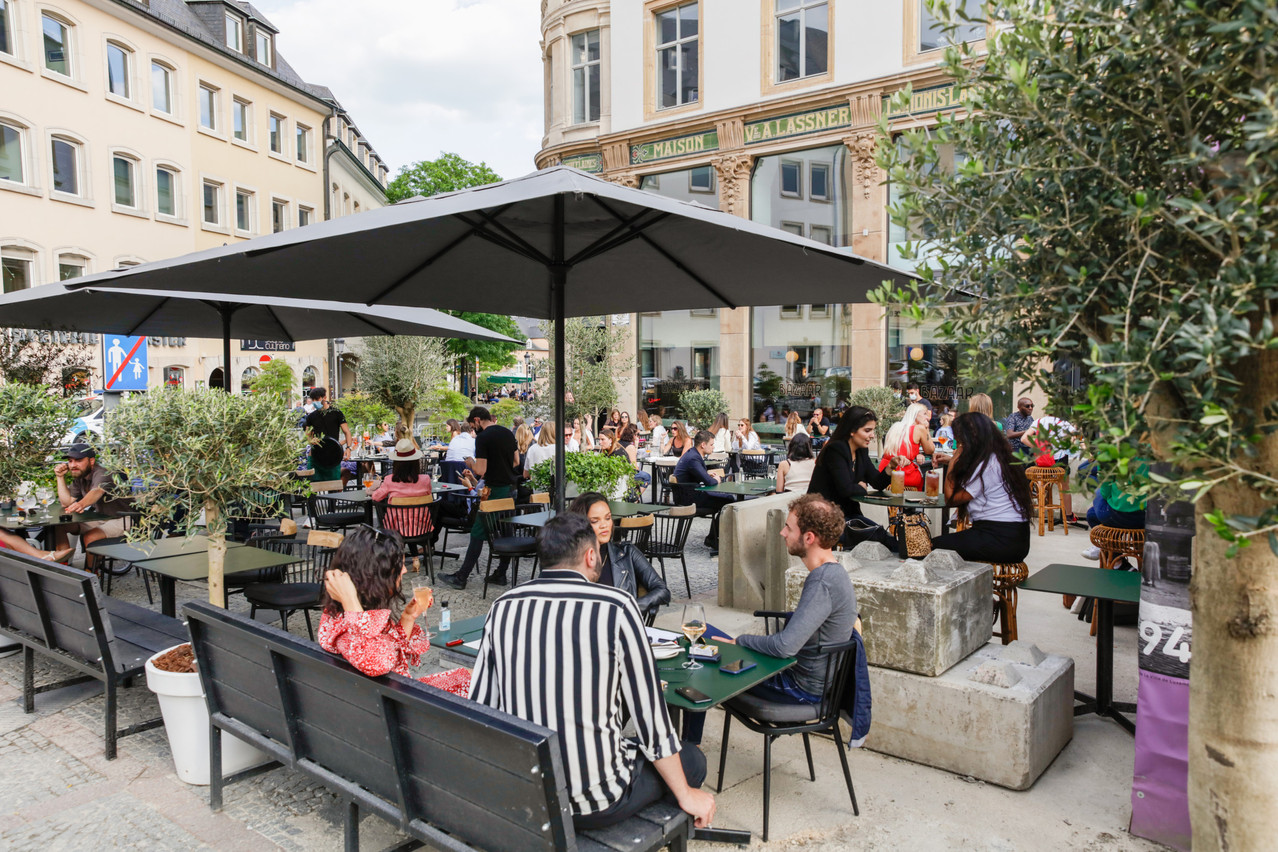It's been two weeks since all restaurants in the country had to switch to the CovidCheck regime. But are they feeling the dreaded impact? “It's a mixed bag,” says François Koepp, secretary general of the Horesca Federation, which represents the hospitality sector. “Some places are sold out, others are suffering. It depends on the location and the type of customer.”
He notes a greater impact for establishments that cater to young people, high school students, students or workers. The same applies to bars and cafés.
Young employees, poorly vaccinated
In the Gare district of Luxembourg City, “there are people dropping by who have neither been vaccinated nor tested and we refuse them,” says Italian eatery Partigiano. This represents about three people a day and the restaurant has been able to run at similar activity to before CovidCheck.
Many people want to stay on the terrace.
Bazaar, a city centre venue switched to CovidCheck ten days before 1 November to make the transition smoother. At the time, “we had a few comments, a very small minority, but also very vindictive, from people saying that it was not normal to do that,” says owner Gabriel Boisante, who also runs Paname, Mamacita and Urban.
Despite these initial worrying signals “it went well, people understood and were happy to be able to stand at the counter and take off their masks,” he says. “It was quieter the first few days, we felt it.” This also coincided with the return of the cold. After more than two weeks, attendance returned to more or less its pre-CovidCheck level.
But not its pre-pandemic level. “We are fully booked almost every night during the week, every night at the weekend. At lunchtime it's more complicated.” He points to teleworking as the reason, but also to the construction work that makes traffic difficult in Luxembourg.
The employees, most of whom are between 20 and 35 years old, also have to undergo CovidCheck. Even if few are vaccinated, everyone has been able to come to work, says Boisante.
People on the terrace
Nona Cojan, manager of the bar Updown in the Grund, has not noticed a drop in the number of customers so far. “Two weeks is not enough time to see if CovidCheck is affecting business or not,” she says. Over the weekend, the bar was “packed with Irish people” who came to watch their football team play Luxembourg. “Many want to stay on the terrace,” Cojan adds. There is more demand than usually for this area since it is not covered by CovidCheck. No worries in terms of the staff as all are vaccinated.
In Belval, the burger restaurant Snooze, which attracts a young or working clientele, has noticed “a little less traffic” since the application of CovidCheck, without being able to give figures.
In Ettelbruck, the Portuguese restaurant La Fiducia is not short of older customers. The restaurant is mainly visited by regulars and families, says owner Carlos Dos Santos. He decided to switch to CovidCheck two weeks before the mandatory date, also to give customers and employees time to adapt. “I didn't notice any impact overnight. There is always a dip, but I don't think it has anything to do with CovidCheck,” says Dos Santos. As far as the employees are concerned, “a large proportion were not vaccinated. They received their first dose after the ministry's announcements, without any pressure from us.”
Fears for the future
What worries the restaurant owners now is the increase in Covid cases, which could lead to more teleworking, according to Koepp. He is still calling for an extension of aid for costs not covered (in the event of a loss of at least 40% of turnover) or for recovery (€250 per employee on short-time working, plus €1,250 per employee for July and August, and €1,000 per employee for September and October, in the event of a drop in turnover of at least 25%), which for the time being only cover the months of July to October 2021.
The minister for small and medium-sized enterprises, Lex Delles (DP), is waiting for a verdict from the European Union before deciding.
“I am confident that they will be extended,” Koepp said after speaking with Delles. “When you have a -35% turnover, you are in a bad way,” he says. He hopes that Luxembourg will not follow the example of Berlin, which has switched from a 3G system to 2G, where the test no longer allows you to enter a restaurant, but only a vaccine or recovery certificate. Or the Netherlands, which has introduced a curfew from 8pm.
This story was first published in French on . It has been translated and edited for Delano.
